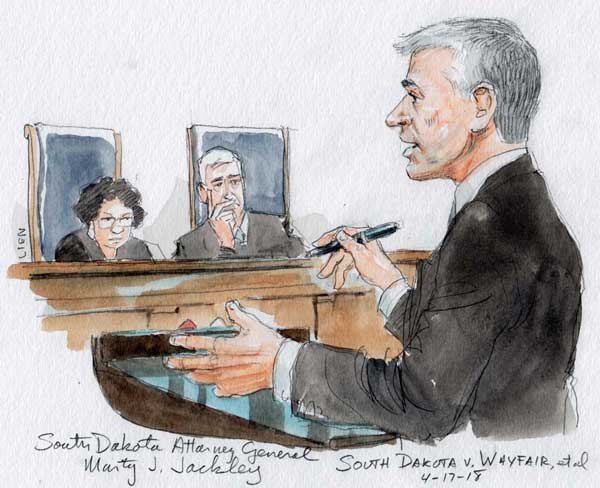Attorney General Jackley Recognizes Historic South Dakota v. Wayfair Decision

PIERRE, S.D. – South Dakota Attorney General Marty Jackley said five years after it was decided, the United States Supreme Court’s decision in favor of South Dakota in South Dakota v. Wayfair remains a major victory for small businesses and Main Street South Dakota.
Today (Wednesday) is the five-year anniversary of the Court’s 5-4 majority ruling in favor of South Dakota. The June 21, 2018 decision meant that states have the right to determine how to address out-of-state sellers of goods.
“It was my honor to stand before the U.S. Supreme Court as South Dakota’s Attorney General representing South Dakotans,” said Attorney General Jackley. “This was about States’ Rights and fairness for Main Street business across our State and the Nation.”
In his remarks to the Supreme Court during arguments held in April 2018, Attorney General Jackley argued that the State was losing large amounts of sales tax revenue because of Congress’ inaction. He said the disparity resulted in local businesses being hurt by “an unlevel playing field.”
South Dakota’s case was supported by local, state and national organizations as well as 40 States, District of Columbia, Puerto Rico, and Virgin Islands.
“This case could not have been brought forth without the support of former Gov. Dennis Daugaard, legislators, the South Dakota Retailers Association, education leaders, and others,” said Attorney General Jackley.
The court’s ruling can be found here: https://www.supremecourt.gov/opinions/17pdf/17-494_j4el.pdf
-30-

A reallocation of taxes.
It’s very difficult to understand where this money goes.
We don’t spend our money on visualization software for the American people to understand their country’s cash flows.
Instead, it’s spend on money capable of allowing anyone with the root kit to watch our daughters in the shower.
If we solidify states’ rights, that’s great unless the state uses that “freedom” to go Totalitarian.
“It’s spent on technology”
Not money.
Sorry, busy morning ..
review: national online sellers had an inherently unfair advantage over local brick and mortar stores and traditional mail order because they weren’t collecting the local sales taxes. as the pendulum swung more toward the sellers because they had no tax in their lower prices, local merchants with tax permits and local and state governments were hit with growing revenue licenses. i know grover nordquist and others tried to turn sd vs wayfair into a new boston-tea-party or something, but jackley’s arguments in favor of honoring fair taxation and against fomenting tax evasion won the day. a good thing for all.
LOSSES not licenses.
Good god John, what kind of cameras do you have installed in your bathroom that can be “root kit” to watch your daughters in the bathroom? Seriously, wtf?
Thank you Deb Peters, the architect of the legislation that was instrumental in creating this case.
Ehh. Marty gets the credit in my opinion.
“Anonymous” = Deb Peters LMAO
Who?
They framed it as equality for local business but the result for me was paying more tax when I purchase online.
Because you were likely illegally avoiding paying use taxes. This wasn’t a new tax, just one they finally started to collect.
Illegally?? Seriously, the dude pushed for more taxes to be paid from folks like you. It was legal before the case was filed… Lil bit of hypocrisy here. Do you want to tax folks more? In this case – yes.
yes illegally, because before Wayfair, the buyers were supposed to keep track of their online spending and pay the tax themselves, directly. Of course nobody did, because nobody knew they were supposed to, and nobody really wants to think about how much they spend on Amazon and eBay every year on stuff they dont need